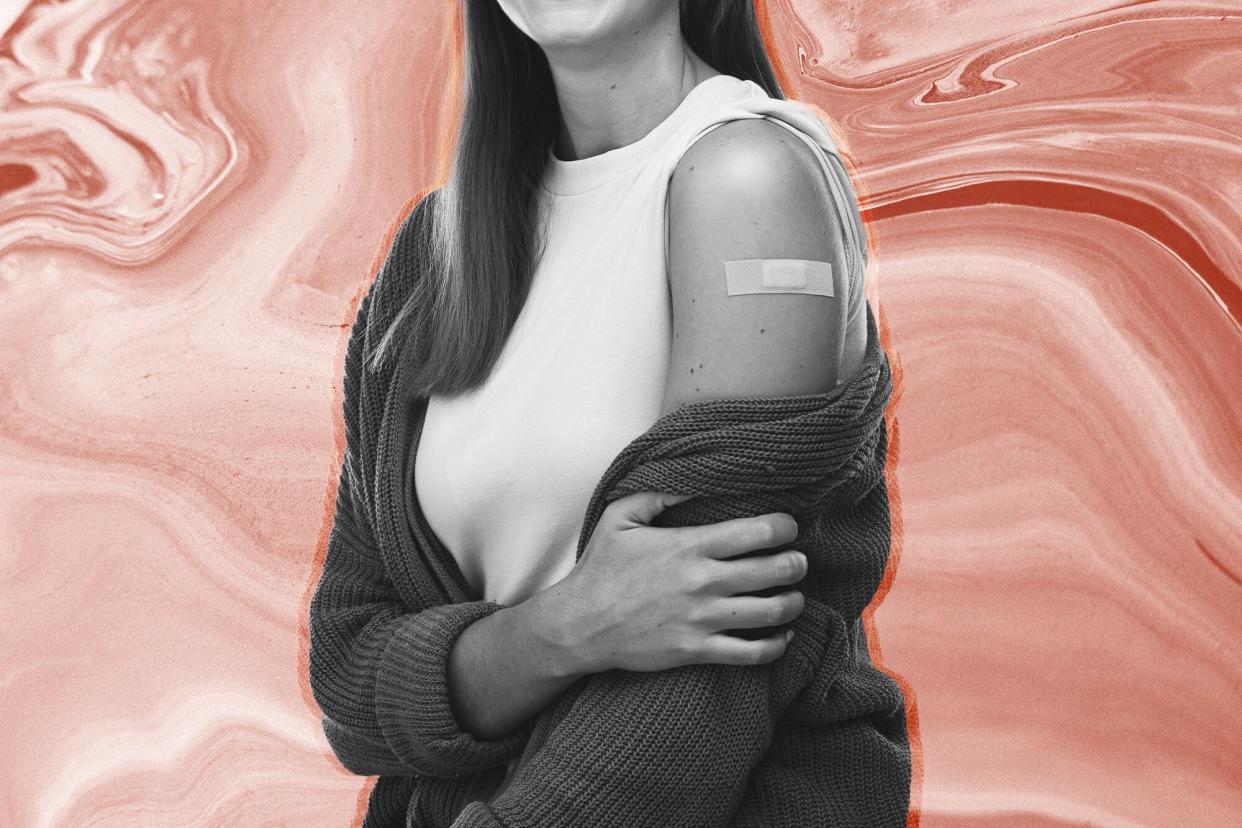New Study Confirms COVID Vaccines May Impact Your Period

Getty Images
Scientific research is finally catching up to what women have been talking about since the COVID-19 vaccines were first available. There's a link between getting the jab and having a longer menstrual cycle, according to a new international study funded by the National Institutes of Health (NIH).
The recent study builds on earlier U.S.-based research published in January 2022, linking an average period increase of less than a day in cycle length "between bleeding" to the COVID-19 vaccine. And its outcome isn't surprising to Dr. Hugh Taylor, M.D., chair of the department of obstetrics and gynecology and reproductive sciences at Yale University and chief of obstetrics and gynecology at Yale-New Haven Hospital.
"We've heard a lot of anecdotal evidence about this," he tells Shape. "For some time now, patients have been saying that their menstrual cycles have been off [after receiving a COVID-19 vaccine]."
Related: The Best Period Tracker Apps to Stay On Top of Your Cycle
The findings also make sense given the way the menstrual cycle works. It's a delicate system that can be subject to change at times, confirms Dr. Taylor. "An infection or some other inflammatory process can easily throw off a menstrual cycle," he says. COVID vaccines are designed to produce an immune system response to fight the virus. "But [the response] can also throw off the menstrual cycle, which is very intricately regulated through complex hormone interactions between the brain [and] the pituitary gland, the ovaries, [and] the uterus," explains Dr. Taylor.
The recent study was conducted using data from nearly 20,000 participants (a majority of which were vaccinated with any of nine different COVID vaccines) from the United Kingdom, Canada, Europe, the U.S., and other parts of the world, said the NIH in a news release. To reach the conclusion that cycle length is impacted by COVID vaccines, researchers analyzed three consecutive menstrual cycles prior to vaccination and at least one more cycle after vaccination. For participants who weren't vaccinated, researchers analyzed four cycles around the same time interval, according to the release.
Related: Can You Get Your COVID Booster If You Have a Cold?
The study found that on average, a person who was vaccinated experienced a menstrual cycle increase of less than one day in each cycle during which they were vaccinated. For most people, the increase resolved during the next cycle and wasn't based on the type of vaccine the participant had, said the NIH. "Women who were younger and who had longer cycle length before vaccination were more likely to experience the increase," added the health agency.
While the study provides support to anecdotal evidence, its results are limited by the fact that the data analyzed was only pulled from the fertility tracking app Natural Cycles and was self-reported by users tracking their temperature and menstrual cycles.
It's also important to remember that the one-day increase in period duration is an average of data collected from the study, says Dr. Taylor. "It's quite a range — and on average, it was it was less than one day, but for some people it was [no additional days], and for other people it was many, many days," he says. Out of the nearly 20,000 participants, 1,342 people had a cycle length change by 8 or more days, according to the NIH.
While knowing a vaccination can cause a variance in your typical menstrual cycle can be worrisome, especially if you're trying to get pregnant or planning fertility treatments, there's no real reason for concern.
"The changes in menstrual cycle length are small," says Dr. Taylor. "And other studies — not this one — but other studies have looked at the effect of the vaccine on fertility, pregnancy loss, pregnancy outcome, [and] all of those have been very reassuring," he continues. "The other thing we know is that menstrual cycles tend to go back to normal very quickly. So within a month or two, one or two cycles, usually the menstrual cycle is back to normal."
Related: A Study Concluded That the COVID-19 Vaccine Doesn't Affect Fertility
What's more, the new research can help doctors and health care providers give patients a heads up as to what to expect post-vaccination. "These findings provide additional information for counseling women on what to expect after vaccination," Diana Bianchi, M.D., director of NIH's Eunice Kennedy Shriver National Institute of Child Health and Human Development, said in the NIH release.
Getting vaccinated is very important, adds Dr. Taylor. "[COVID-19] is a serious disease, and the protection afforded by the vaccine certainly outweighs any risk of throwing the menstrual cycle off," he says.
The study's results should actually be comforting, suggests Dr. Taylor. "I think...people can rest assured that this is a minor nuisance or inconvenience," he says, noting that if someone's menstrual cycle changes or is very off, he would definitely advise them to get it checked out under normal circumstances. "But if we know...this is a normal response to the vaccine, it can be reassuring to people."
There's more research to come in this area. The study's authors called for additional research on other vaccination-related changes to periods, such as menstrual flow, pain, and unexpected vaginal bleeding. That's in addition to studies to help get to the bottom of why these changes may happen, according to the NIH.
For now, if you noticed a change in your period after getting a COVID vaccine shot, you might feel relieved to know you certainly weren't the only one. If you're concerned about this side effect, you can always talk to your health care provider before getting vaxxed or boosted.
Fact-checked by Emily Peterson.

